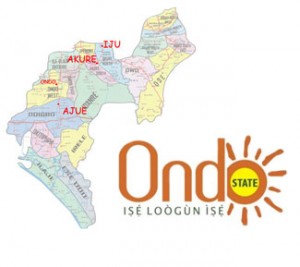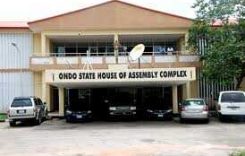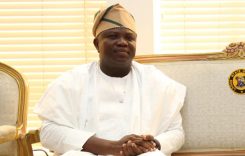Going by the above-named title and bearing in mind the popular Yoruba adage, which says “Oba meji ki gbe ninu ilu kan,” meaning no town can be ruled over by two kings, one’s mind begins to run riot about this strange town called Ajowa-Akoko. Indeed, Ajowa-Akoko is a strange town because it boasts of eight kings. The eight communities came together to form the town and they are all cohabiting without any crisis thus far. Ajowa-Akoko is a town in Akoko Division of Ondo State. It is the boundary town between Ondo and Kogi states. Communal crises have ravaged some other Yoruba towns, claiming many lives and properties over who controls the land, but this is not so with Ajowa. In 2014 alone, the town could boast of two serving Major-Generals, a member of the State House of Assembly and seven professors at Obafemi Awolowo University, Ile-Ife and University of Ibadan as some of its prominent indigenes within the eight communities. It has a privately-owned College of Education and the city is rich with its cultural heritage. WESTERN POST’s TEMITOPE ADEDEJI went on a trip to the town to dig into the historical background of Ajowa town, what makes the town thick and the secret behind its peaceful co-existence. His report…

Historical Background
The town called Ajowa is a peculiar community of eight towns in the Akoko North West Local Government Area of Ondo State. Many in the town refer to Ajowa as an amalgam cobbled together by God Himself. Sixteen towns and villages came together to form for the ‘amalgamation,’ the same way Northern and Southern Protectorates of Nigeria were brought together by the colonial masters to form one Nigeria in 1914. The 16 communities namely: Akunnu, Ase, Daja, Efifa, Eriti, Esuku, Ibaram, Iboropa, Ijasi, Ikaram, Kakimo, Ojo, Ora, Oso, Uro and a number of other smaller units within that circle were contacted to have a common union. There was this fear by the smaller villages that they might be swallowed by the larger ones. According to history, there were concessions and negotiations and re-alignments, which eventually led to the birth of Ajowa as presently constituted.
The amalgamation of the eight towns that agreed to be under one umbrella came to being in 1955 was facilitated by P. A. R.F. Olisa, who happened to be the representative of the area at an Ibadan Conference in 1954. He thought that the coming together of these towns would enhance and better their lots mostly when making any demand before the then government of the old Western Region. For the government too, the strongest pull factor at the time was the desire to access the nooks and crannies of the land with their developmental programmes. It was felt that it was easier and cheaper for government to reach one large site than eight scattered ones. And thus, Ajowa, which literally translates to “We Come Together” that is (A-We, Jo-Together, and Wa - Come) was born. The first sod was turned on 10th December, 1995. Thus, the pull factor is no less important and relevant today than it was at that time. If anything, it has become more relevant today in the pursuit of a successful and meaningful impacting of the fruits of democracy into the lives of the people of Ajowa.
Educationally Blessed
Educationally, the town Ajowa is blessed. It has many public primary and secondary schools, with a few private ones running from kindergarten through the primary to the secondary levels. The population of each town belong mainly to Christianity and Islam vestiges of the traditional religion practices that have been brought over from different backgrounds.
In Iludotun, where Oba Kayode Olisa, the Chairman Council of Obas among the remaining seven, reigns, the town is known for only Christianity and Islam, which are practiced as their official religions. And the Christians are split among denominations.
Each Community Keeps its Culture, Way of Life
Though, the eight towns are made up of distinctive kingdoms, moved to site at the same time, settling at the nearest point of entry. What was unanimously agreed to is that each town would not be subsumed or swallowed by the whole or any part thereof. This is why each came as an entity of a kingdom, remaining so till today. It is such that each monarch retained his rule over his own town, maintaining its cultures and ways of life without any interference or imposition by the other. It was collectively agreed to give absolute mutual respect for the ways of life and cultures and tradition of each entity and most importantly, each town maintaining its original land holdings in the area of tenancy and land use.
Ajowa Formed on Love- State House of Assembly Member Banso
Hon. Adeyinka Banso, a member of the state House of Assembly and an illustrious son of the town, said Ajowa was formed on a platform of love and oneness. He also emphasized solely on the fact that foundation is the principal thing in whatever we do which has really helped the town from time immemorial till date.
Another resident of the town who refused to give his name corroborated Banso’s position, saying the amalgamation was involuntary. “It was not forced. The larger and smaller units agreed to come together. They knew together they are stronger and they continue to maintain their separate identity. It’s an arrangement political scientists would call confederalism today.”











otunba obadun
- Edit
Good job but your reporter needed to do a thorough job. He/she just brushed the story of Ajowa. Not so in-depth.
ogedengbe victor olusoji
- Edit
Some of the names were misspelt but all the same good job. The progenitor of Ajowa was Pa R.A Olusa and not Olisa.
ogedengbe victor olusoji
- Edit
Ajowa,our collective pride.
oladimeji ajayi samuel
- Edit
I am proud being an indegene of Ajowa. And I will call Ajowa’s motto: peace, love, unity and progress. May God bless Ajowa. AMEN.
Hon Oluseyi
- Edit
A privately owned polytechnic has just been established to compliment the developmental activities in the town. It is named EDOLA POLY. Ajowa Akoko
Omotosho Jay Eff
- Edit
Permt me to use this medium to call on the leadership of this Country to take go to Ajowa Akoko and learn from its leadership the modality for mutual understanding and corporate coexistence.
Both the leadership of the Senate n the House of Reps should unglove their hands of pride and haughtiness and come to Ajowa Akoko to learn more on governance. Learning is a continuous process and must be embraced by all.
It is well with Ajowa Akoko , it is well with Nigeria